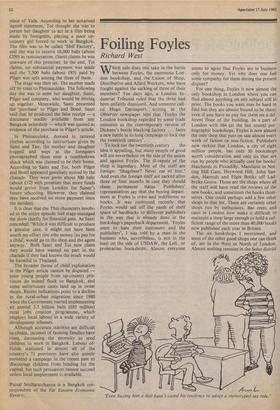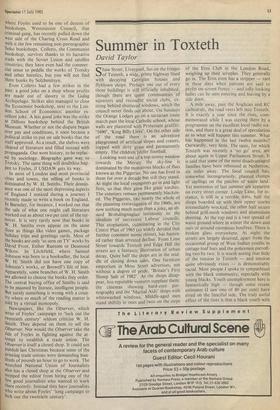Foiling Foyles
Richard West Which side does one take in the battle between Foyles, the enormous Lon- don bookshop, and the Union of Shop, Distributive and Allied Workers, who have fought against the sacking of three of their members? Ten days ago, a London In- dustrial Tribunal ruled that the three had ) been unfairly dismissed. And someone call- ed Hugo Davenport, writing in the Observer newspaper says that `Foyles the London bookshop regarded by some trade unionists as the contemporary version of Dickens's bottle blacking factory ... faces a new battle in its long campaign to lock out the twentieth century'.
To lock out the twentieth century . .. the idea is appalling, but many people of good will are nevertheless on the side of the union and against Foyles. The ill-repute of the shop is legendary. Most of the staff are foreign: `Shagsbeer? Never ear of him.' And even the foreign staff are sacked after three or four months in case they should claim permanent status. Publishers' representatives say that the buying depart- ment at Foyles is crass and indifferent to books. It was rumoured recently that Foyles would sell off the yards of shelf space of hardbacks to different publishers in the way that is already done in the bookshop's paperback department. `Foyles seem to hate their customers and the publishers', I was told by a man in the business who, nevertheless, is not in the least on the side of USDAW, the Left or proletarian bookshops. Almost everyone seems to agree that Foyles are in business only for money. Yet why does one feel some sympathy for them during the present dispute?
For one thing, Foyles is now almost the only bookshop in London where you can find almost anything on any subject still in print. The books you want may be hard to find but they are almost bound to be there; even if you have to pay for them on a dif- ferent floor of the building. In a part of London with 164 (at the last count) por- nographic bookshops, Foyles is now almost the only shop that puts on sale almost every work of fiction or non-fiction. Publishers now reckon that London, a city of eight million people, has only 30 bookshops worth consideration and only six that are run by people who actually care for books: Hatchards in Piccadilly, Mandarin in Not- ting Hill Gate, Heywood Hill, John San- doe, Harrods and Elgin Books off Lad- broke Grove. Those are the shops where all the staff will have read the reviews of the new books, and sometimes the books them- selves. One could perhaps add a few other shops to that list. There are certainly other shops run by enthusiasts. But rents and rates in London now make it difficult to maintain a shop large enough to hold a suf- ficient range of the more than 40,000 books now published each year in Britain.
The six bookshops I mentioned, and most of the other good shops one can think of, are in the West or North of London. Almost nothing remains in the Soho district
'Even buying him a doll hasn't cured his tendency to adopt a stereotyped sex role.'
where Foyles used to be one of dozens of bookshops. Westminster Council, that criminal gang, has recently pulled down the west side of the Charing Cross Road and with it the few remaining non-pornographic Soho bookshops. Colletts, the Communist bookshop, survives thanks to its lucrative trade with the Soviet Union and satellite countries; they have even had the commer- cial sense to peddle the works of Trotsky and other heretics, but you will not find there books by Solzhenitsyn.
Even Colletts had a few strikes in the Past: a good joke on a shop whose profits are made out of slavery in the Gulag Archipelago. Strikes also managed to close the Economist bookshop, next to the Lon- don School of Economics: another ex- cellent joke. A less good joke was the strike at Dillons bookshop behind the British Museum. Whether or not the dispute began over pay and conditions, it soon became a Political strike to put on sale books that the staff approved. As a result, the shelves were cleared of literature and filled instead with propaganda. Out went history, to be replac- ed by sociology. Biography gave way to Trotsky. The same thing will doubtless hap- Pen to Foyles, if USDAW gets its way.
In most of London and most provincial cities and towns, the selling of books is dominated by W. H. Smiths. Their domin- ance was one of the most depressing aspects of England I noticed during a journey I recently made to write a book on England. In Barnsley, for instance, I worked out that the sale of what one might call literature worked out as about two per cent of the tur- nover. It is very rarely now that books in W. H. Smiths even appear on the same floor as things like video games, package holiday trips and greetings cards. Most of the books are only 'as seen on TV' works by David Frost, Esther Ransom or Desmond Wilcox. In Litchfield, where Samuel Johnson was born to a bookseller, the local W. H. Smith did not have one copy of Johnson's works, or Boswell's life of him. Apparently, some branches of W. H. Smith are allowed to choose the books they order. The central buying office of Smiths is said to be manned by literate, intelligent people. Rut surely something is wrong with a coun- try where so much of the reading matter is sold by a virtual monopoly.
Newspapers, like the Observer, which write of Foyles' campaign to 'lock out the twentieth century' seldom criticise W. H. Smith. They depend on them to sell the Observer. Nor would the Observer take the side of Foyles in fighting against the at- tempt to establish a trade union. The Observer is itself a closed shop. It could not Publish last Christmas because some of the Printing trade unions were demanding hun- dreds of pounds an hour to go to work. The wretched National Union of Journalists also has a closed shop at the Observer and stopped the editor from hiring one of the few good journalists who wanted to work there recently. Instead they have journalists Who write about Foyles' long campaign to lock out the twentieth century'.



































 Previous page
Previous page